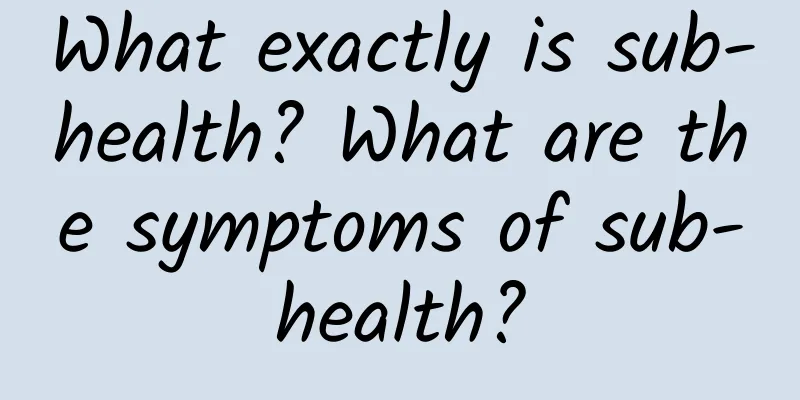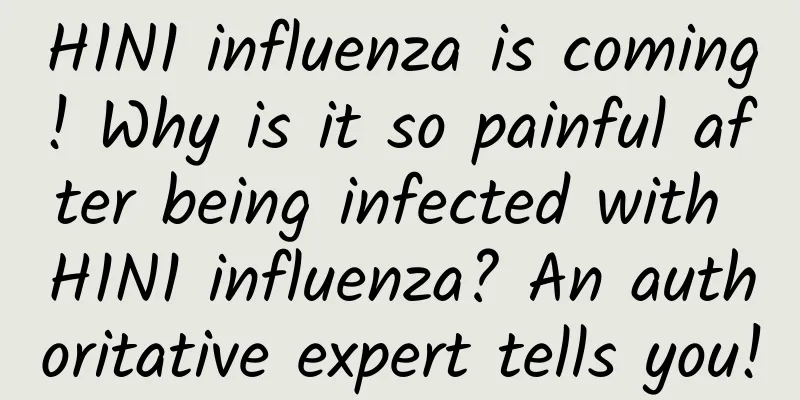What exactly is sub-health? What are the symptoms of sub-health?

|
Author: Peng Yuqing, Chief Physician, Oriental Hospital, Beijing University of Chinese Medicine Reviewer: Dong Fuhui, Chief Physician, Institute of Orthopedics and Traumatology, China Academy of Chinese Medical Sciences In 1999, the World Health Organization listed sub-health and AIDS as the number one enemy of the 21st century. Sub-health is the number one killer that affects health in modern society. Sub-health is a word that everyone often talks about nowadays, but many people do not have a clear understanding of the word sub-health. So, what does sub-health mean? What is a sub-healthy state? 1. What is sub-health status? We know that there are healthy states and disease states. Sub-health is the third state between the disease state and the healthy state. It is another health state outside of new medicine. The medical community also calls it the pre-disease state or the latent disease state. Figure 1 Original copyright image, no permission to reprint Sub-health refers to the state in which the body's adaptability, vitality, and function are in a state of low function or disharmony. Sub-health is not a disease, but health problems still exist. Sub-health mainly includes three aspects: The first is physical sensation. Any physical sensation, such as headache, body pain, fear of cold or heat, palpitation, insomnia, gastrointestinal problems, digestive system problems, endocrine problems, and problems with body functions are called physical sub-health. The second is psychological problems, such as various negative emotions, fear, anxiety, depression, and depression. This negative state of mind is called psychological sub-health. The third is social attributes. Disharmony in social attributes, such as unhappiness and pressure in social and interpersonal relationships, is called social sub-health. Figure 2 Original copyright image, no permission to reprint I often feel tired and weak, but I am not sick. Is this considered a sub-healthy state? 2. Is frequent fatigue a sub-health condition? Some people think that being a little tired or not in good shape is not a problem. Many problems are actually easily overlooked by everyone. Fatigue and weakness may be a signal and the essence of sub-health. Fatigue is a sign of low function or decreased adaptability, which is the number one state of sub-health. When fatigue occurs, it must be taken seriously and adjusted. Figure 3 Original copyright image, no permission to reprint Fatigue can be divided into psychological fatigue, mental fatigue, and physical fatigue according to its nature. Physical fatigue refers to physical sensations, such as tiredness, weakness; joint pain, stiffness, and discomfort; headaches and back pain, which are all manifestations of physical fatigue. Mental fatigue is mental fatigue or mental fatigue. Some people are mentally fatigued and will become intolerant, impatient, and fragile. They will feel uneasy about something, and their stress and tolerance will decrease. They may even suffer from insomnia, sadness, anxiety, fear, tension, and even grievances. Mental fatigue, excessive use of the brain can lead to brain fatigue. The main manifestations of brain fatigue are dizziness, head swelling, tinnitus, confusion, memory loss, slower and more chaotic thinking, and severe cases may be accompanied by syncope and severe insomnia. In addition, fatigue can be divided into mild fatigue, moderate fatigue, and severe fatigue according to its severity. You feel tired, but after rest and self-adjustment, you cannot recover. The fatigue persists repeatedly. If it lasts for more than 6 months, of course you have to rule out some secondary diseases. This functional fatigue is called chronic fatigue. 3. Which groups of people are prone to sub-health and chronic fatigue? The characteristics of modern society are high pressure, high competition and fast pace. Therefore, the main target population for chronic fatigue is mostly sedentary people, people who do mental work and people under high pressure. Concentrated in the industry, they are high-tech, or "white-bone spirits", white-collar workers, backbones, and elites. They often have to bear great work pressure, or corporate pressure, social pressure, and academic pressure. They often use their brains and overuse their minds. These people will easily suffer from chronic fatigue. The core cause of chronic fatigue is endogenous, invisible, psychological, mental, and neurological, and is caused by excessive stress. 4. Will fatigue lead to death from overwork? Fatigue occurs when one is in a state of chronic stress. Problems will arise in many systems of the body, such as the immune system, endocrine system, metabolic system, and cardiovascular system. Corresponding diseases will appear and many problems will occur. For example, insomnia, anxiety, depression, obesity, fatty liver, metabolic syndrome, early hypertension, early arteriosclerosis, and even some immune diseases, such as allergies, chronic inflammation, joint pain, etc., these are all early stages of major diseases. The most frightening thing is death from overwork. When you are tired and not in good shape, if you still think that you are not sick and your indicators are normal, you should continue to work hard, you may end up dying from overwork. Many high-tech people die suddenly. When we trace their medical histories, we find that they have no underlying cardiovascular disease problems. Some of them even have good blood lipids and blood pressure, and their blood vessels are smooth during ultrasound examinations. Yet they still die suddenly. What is the reason? After adrenal failure, the human body is in a state of extreme disorder. If there is pressure at this time, it will lead to arrhythmia, or rupture and spasm of the blood vessel endothelium, leading to thrombosis, and sudden cardiac death will occur. Therefore, when you are under stress or in a state of extreme fatigue, if you have recently experienced symptoms of chest tightness and shortness of breath, you must pay attention and be alert to death from overwork. |
<<: The recurrent edema in patients with kidney disease is closely related to these 4 factors!
>>: What should I do if I have proteinuria? This article will teach you how to solve it
Recommend
What is the uterine cavity?
Cervical polyps, cervical erosion, cervical cysts...
What is the cause of bleeding in the third month of pregnancy?
The first three months of pregnancy are considere...
World Allergy Day | Children's "Self-report" on allergic rhinitis
Author: Zhou Yimei: The 989th Hospital of the Joi...
How to have an abortion in 3 months of pregnancy
Pregnancy is a big event for women. It is a turni...
Will having sex the day before your period delay your period?
A woman's ovulation period is a few days befo...
Why do my legs hurt during menstruation?
Many female friends experience uncomfortable symp...
The truth is hidden in the eyes: It’s just insomnia, why should I take antidepressants?
“Some patients’ insomnia never gets relief, or th...
Pregnant woman wants to urinate again after urinating
At 39 weeks of pregnancy, it is already the end o...
What are the side effects of contraceptive pills?
I believe everyone has heard of birth control pil...
What should I do if I haven't had my period for a month after curettage?
Normal menstruation is something that every girl ...
How to treat severe endometritis?
We all know that endometritis is a particularly c...
What are the dangers of having sex during menstruation? This problem is easy to occur!
As we all know, women cannot have sex during thei...
What does intrauterine calcification mean?
Calcification can occur in many parts of the huma...
How to regulate delayed menstruation after taking Chinese medicine
Many women choose to take Chinese medicine to tre...
What should women eat if they have liver problems?
The incidence of liver disease in women is very h...









